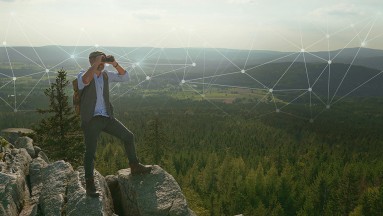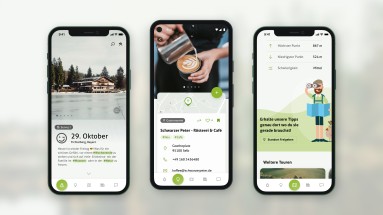Page content
Wunsiedel on the way to becoming a Smart Region

Photo: Smart Fichtelgebirge
The first porcelain factory was opened in the Fichtelgebirge in the 1820s - the porcelain industry characterised the region for around 170 years until its demise in the 1990s brought about a major structural change. The result: migration and negative economic consequences for the entire region - this development shows how important resilience is for rural regions, says Oliver Rauh, Project Manager Smart Fichtelgebirge: "It was recognised early on that the increasing availability of digital technologies and the growing importance of data and data analyses offer an opportunity to overcome local challenges and develop innovative approaches to improve the quality of life, create new jobs and promote sustainability." However, this would not be possible without appropriate funding - so the "Smart Cities Model Projects" funding programme came at just the right time for the district of Wunsiedel, as it still has to work with consolidation requirements.
From the district app to broadband expansion
As part of the funding programme, the district is now tackling various digitalisation projects - always in close cooperation with the district and the associated municipalities. For example, the Fichtelgebirge Innovation and Service Company was founded to bundle projects such as school IT, mobile phone and broadband expansion or LoRaWAN and to generate synergy effects.

Digitalisation in the region is particularly visible in the district app. In the FichtelApp, tourists and locals alike can find event tips, an overview of shops and pubs as well as so-called "home information" - important contacts to doctors' surgeries, transport information or even the district administration. All bundled together and always available on your smartphone. The district relies on a shared database with the 17 local authorities belonging to the district - this has both significantly increased the data quality and reduced the maintenance effort for the project team, emphasises Rauh.
The next step will be to set up a district-wide LoRaWAN network in order to optimise processes with the help of real-time data - for example waste collection.
For the district of Wunsiedel, the Smart City or Smart Region is a cooperation project between the district, local authorities and citizens. For this reason, citizen participation plays an important role, says Rauh. With the help of an online participation platform, analogue participation formats and an urban laboratory, local people can get directly involved in the development of their region. The city lab also offers workshops and presents sensor applications to demonstrate their added value.
As all good ideas are only half as effective if nobody hears about them, Wunsiedel also attaches great importance to public relations work: "We are convinced that projects only work in the long term if the majority of the population has heard about them at an early stage or has had the opportunity to express their own opinions and make suggestions."
Tips and tricks from Wunsiedel
"In our opinion, there is no completely standardised approach in the smart city sector, as every region/city has its own specifics, challenges, players and history that should determine the core of a smart city," says Rauh. He therefore recommends talking to all key local stakeholders at an early stage and developing a common vision: "A well-coordinated strategy with clearly defined implementation projects makes subsequent implementation much easier. When defining the implementation projects, it is important to consider both smaller quick wins and ambitious larger projects. Quick wins can help to build trust and interest among the population."
Wunsiedel can count on broad public approval: "So far, the project has been perceived positively across the board and we have received little to no negative reactions. However, we have never focused on digitalisation in our Smart City model project, but have always dealt with the question of how we can sustainably improve the quality of life in the Fichtelgebirge. We have therefore not developed a classic digitalisation strategy, but a district development concept that outlines both analogue and digital projects."
Together with the district's senior citizens' representative, measures were developed to get older people interested in the new projects - for example, different personas were used in the development of the FichtelApp, as younger and older people/each user group have different requirements for the app's design, and the public relations work not only relies on online offerings and social media, but also traditional media such as newspapers and radio to reach older citizens.
The journey as a goal
Wunsiedel has not set any criteria as to when the district becomes a "smart region", instead the journey is the goal, says Rauh: "The process of becoming a smart region will never really be complete, as both the technical possibilities and the requirements for cities and regions are developing very quickly. Our aim is to actively shape this process in order to continue to establish the Fichtelgebirge as an attractive place to live and work."
Become an exhibitor at #SCCON25
As a driving force for the future of digital administration and for equal digital living and working conditions in cities and rural areas, the Smart Country Convention is a must for all stakeholders who actively advance the digital transformation. Are you interested in advancing the digitization of our cities and municipalities too? Join us and position your company or municipality as an expert in digitalization in the public sector.



